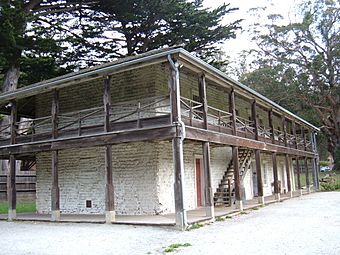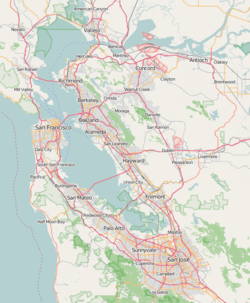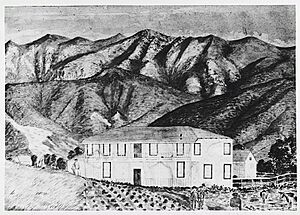Sánchez Adobe Park facts for kids
Quick facts for kids |
|
|
Sanchez Adobe Park
|
|
 |
|
| Location | Linda Mar Blvd., 1 mi. E of CA 1, Pacifica, California |
|---|---|
| Area | 5 acres (2.0 ha) |
| Built | 1785 |
| Architect | Multiple |
| Architectural style | Adobe–Spanish Colonial |
| NRHP reference No. | 76000525 |
| Added to NRHP | April 13, 1976 |
The Sánchez Adobe Park is a special historical place in Pacifica, California. It's home to the Sánchez Adobe, an old building that tells many stories. You can find it at 1000 Linda Mar Boulevard, right by San Pedro Creek. It's about a mile from the Pacific Ocean in the Linda Mar Valley. This park covers about 5.5 acres and was created in 1947. The Sánchez Adobe is so important that it became a National Register Historical District in 1976. It's also known as California Landmark 391.
Contents
History of Sánchez Adobe Park
The land where Sánchez Adobe Park sits has a very long and interesting history. The Sánchez Adobe building itself is a great example of Mexican-era architecture in San Mateo County. Experts have studied the area and found four main periods of history. After these periods, the County of San Mateo bought the site in 1947.
Native American Ohlone History
Long before any European settlers arrived, the Ramaytush band of the Ohlone people lived here. They had a village called Pruristac. You can still find signs of their village, like a shell midden (a pile of shells and other waste) near the park ranger building.
In 1769, a Spanish explorer named Gaspar de Portolà camped nearby. He stayed for a few days during his expedition through California. His journals describe meeting the villagers. They also wrote about hunting and eating a grizzly bear.
Many Ohlone people from Pruristac later moved to Mission San Francisco de Asís (also called Mission Dolores). This happened in the late 1700s. Two men from Pruristac, named Hilarion and George, became leaders at Mission Dolores. They were important figures there until they died in 1807.
Mission Period: 1786 to 1834
In 1776, the Spanish built a Mission and a fort in nearby San Francisco. In 1786, the Mission set up an outpost at this site. It was called San Pedro y San Pablo Asistencia. This outpost was used for missionary work and farming. They grew crops like wheat, corn, and beans to support the main Mission.
The outpost had a granary (for storing grain), a chapel, and other rooms. Not much is left of these buildings today. However, archaeologists have found where they once stood. After a few years, farming was stopped because the Native American population decreased. The outpost then focused on raising cattle. The outpost was closed in 1834 when the California Mission system was dismantled.
Mexican Rancho Period: 1839 to 1848
Francisco Sánchez was an important leader in San Francisco. He was given a large piece of land by the Mexican government. This land included much of what is now northwestern San Mateo County. It was called Rancho San Pedro.
Sánchez built his adobe home on this ranch. He started building it in 1842 and finished in 1846. It's believed that he might have used some bricks from the old Mission outpost to build his new home.
American/Kirkpatrick Period: 1871 to 1946
In 1871, Edward Kirkpatrick bought the property. He made many changes to the Adobe in the late 1880s. He made it much bigger, adding twenty rooms. Over the years, the Adobe was used for different things. It was a hotel called the Adobe House. During Prohibition (when alcohol was illegal), it even became a secret bar called a speakeasy. Later, in the 1940s, it was used as a farm building for growing artichokes.
Modern Period
The County of San Mateo bought the Sánchez Adobe and the surrounding land in 1947. They started a big project to restore the Adobe. This work was finished in 1953. They fixed the building and added other structures like a caretaker's house. In 2002, the Adobe got a new roof as part of more restoration work.
The City of Pacifica celebrates the area's history with an event called Rancho Days. It happens every September. It includes music, historical reenactments, and food.
On October 26, 2019, a special "Ohlone Day" was held at the Adobe. Hundreds of people gathered to honor the Ohlone people. This event celebrated the first inhabitants of the area, the Aramai of the Ramaytush Ohlone village of Pruristac. A new visitor center also opened at the park on the same day.
The San Mateo County History Museum now runs the Sánchez Adobe as a historic house museum. Visitors can explore the home and see artifacts found during archaeological digs. You can also see where the original farm buildings were located. Admission is free. The museum also offers programs for schools. These programs teach students about what life was like on a California rancho.
See also
- California Historical Landmarks in San Mateo County
- Mission Dolores Outpost
- Mission Santa Clara de Asís
- Mission San Francisco de Asís
- Rancho San Mateo
- Rancho de las Pulgas
Historic Designations
The Sánchez Adobe Park has received important historical recognitions:
- National Register of Historic Places #NPS–76000525 - This designation recognizes the Sánchez Adobe Park in Pacifica, California, as a significant historical site. It includes the location of the original San Pedro y San Pablo Asistencia.
- California Historical Landmark #391 - This marks the Sánchez Adobe as an official California Historical Landmark.
- Early History of the California Coast, a National Park Service Discover Our Shared Heritage Travel Itinerary - The Adobe is also part of a National Park Service travel guide.
 | Delilah Pierce |
 | Gordon Parks |
 | Augusta Savage |
 | Charles Ethan Porter |





